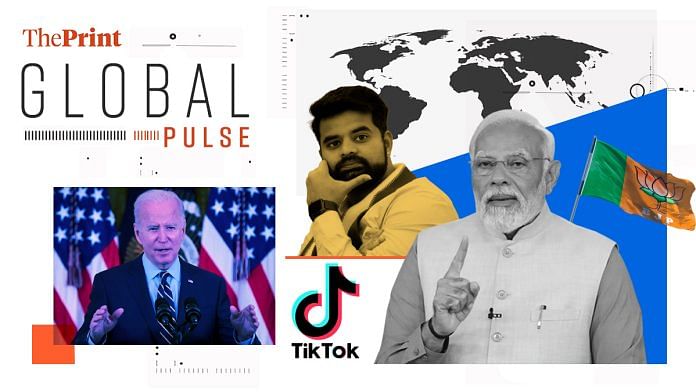New Delhi: Have India’s “economic benefits” come at a cost? That’s what Financial Times chief foreign affairs columnist Gideon Rachman discusses with Ravi Agrawal, editor-in-chief of Foreign Policy magazine, in his latest podcast ‘Modi’s Mission’.
The two journalists discussed Prime Minister Narendra Modi’s vision for India, the reason for his repeated electoral successes, and what the future holds for the country.
Modi’s success, Aggrawal says, isn’t simply that of a strong leader. Instead, he represents the “new idea of India” — a country that prioritises “Hinduism over others” and is “openly proud of its Hindu heritage and culture and wants to create a Hindu homeland”.
According to him, today’s India is a “country that prizes a leader who can get things done even if it comes at the expense of individual freedom and liberalism and a country that believes in projective industrial policy and welfarism along with Hindu revivalism”.
“All of this crucially is very different from the old idea of India which its founding fathers put in place in 1947, the year India became independent… and was a collection of states and cultures and languages,” Aggrawal notes in the podcast.
Will the sexual assault cases against Prajwal Revanna, a Janata Dal (Secular) leader and the grandson of the former Indian prime minister H.D. Deve Gowda, affect ally BJP in Karnataka? Author Biman Mukherjee considers this question in South China Morning Post‘s latest piece ‘India’s Modi risks losing key state election over alleged sex scandal involving ex-PM’s grandson’.
“At one level, the onus is also on the BJP to come out and address the issue. The prime minister (Modi) had campaigned for Revanna,” Sanjal Shastri, assistant professor at the western Indian city of Pune’s Flame University, tells South China Morning Post. “It is quite clear that the BJP is on the back foot.”
According to the piece, opposition leaders such as Congress’s Priyanka Gandhi have criticised Modi’s silence on the scandal, which could cast a shadow on the BJP’s prospects in Karnataka.
“[The scandal] would disturb them definitely. This event is like squeezing lime into milk,” the piece quotes Harsh Ramaswamy, an independent political analyst, as saying.
In his opinion piece in Bloomberg titled ‘Life After TikTok Isn’t So Fun. Just Ask India’, Mihir Sharma discusses the ramifications of the 2020 TikTok ban in India and the potential implications of a similar US ban on the Chinese app.
Contrary to the belief, the article argues that it significantly impacted India’s creator economy, and tech giants like Meta Platforms and Alphabet Inc. benefitted from it.
“It may seem a small thing to lose the ability to make trainspotters, border collies and sea shanty singers come-from-nowhere stars. But the costs of banning TikTok might be bigger than US leaders think. Perhaps we in India don’t miss TikTok — but how would we know?” Sharma asks.
In CNN’s article, ‘No one is bigger than him’: On the campaign trail with India’s popular yet divisive leader’, author Will Ripley talks about PM Modi’s popularity and “divisive” politics.
Following the leader during his campaign trial in Uttar Pradesh, Ripley writes that while Modi’s supporters praise his welfare policies and leadership, critics fear rising religious persecution under his Hindu nationalist agenda.
“In many ways, Modi is part of the wider global wave of populist leaders with an authoritarian streak that have amassed a fervent voter base in recent years,” he notes.
Russia’s ‘chemical weapons’, Joe Biden calling India & Japan ‘xenophobic’— from around the world
The US has accused Russia of deploying chemical weapons in Ukraine — an allegation that The Kremlin calls “baseless and unsubstantiated. Read this BBC report to know more.
US President Joe Biden has called Japan and India “xenophobic” countries that don’t welcome immigrants. He was comparing their immigration laws with that of the US to claim that it’s this outlook that has caused the two countries — along with Russia and China — to “stall badly economically”. Read this Guardian article for more.
Also Read: World’s hottest election, ‘divisive rhetoric’ by Modi & India’s digital payments revolution



